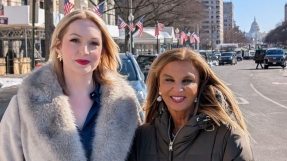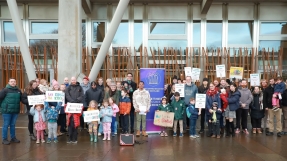Prince Harry announced his engagement to Meghan Markle on Monday morning, after proposing earlier this month in London.
The wedding will take place in the spring, Clarence House announced in a statement, prompting wild speculation about the service and style of the day.
Kensington Palace, who handle communications for Prince Harry, have spoken to Lambeth Palace, the home of the Archbishop of Canterbury, but a spokeswoman refused to comment over whether Justin Welby will be taking the service, other than to say more details would be announced this week.
It is convention that the Archbishop presides over royal weddings. If he did it is thought to be only the third marriage he will have officiated at since he was appointed - the others being those of his daughter Katherine and his head of communications, Ailsa Anderson.
However Meghan Markle's status as a divorcee may complicate the decision.
The Church of England does not have an outright ban on remarriages in church but says it is only in 'exceptional circumstances' a divorced person may marry again in church. The decision lies with the local priest who, according to CofE guidance, should ask probing questions such as 'what have you learned from your previous marriage?' and 'has there been healing of past hurts?'
When Prince Charles married Camilla Parker-Bowles, both of whom had been married before, they had a civil ceremony in Windsor Guidhall followed by a Church of England service of prayer, which included asking for forgiveness.
However, given both Prince Harry's and Meghan Markle's status and popularity it is unlikely they will have such a private wedding.
As to who will be involved, the Archbishop of Canterbury is not thought to have any personal objection to being the celebrant at a wedding with a divorcee and so is not likely to object if asked.
Other key players in the service would typically include the Bishop of London. However following the retirement of Richard Chartres earlier this year, the step-in acting Bishop of London, Pete Broadbent, is famously anti-monarchy having referred to Prince Charles as 'big ears' and called the Royal Family 'philanderers'. In what was seen as a snub, the Queen asked Richard Chartres, the former Bishop of London, to stay on as Dean of the Chapels Royal and oversee major events with the royals until a new bishop is named.
The move represented a break from convention with the Bishop of London and the Dean typically the same person since 1748.
A new Bishop of London is due to be announced in the new year but it is unlikely he or she will be officially installed until after the wedding in the spring. This means Richard Chartres could have a role in Harry's wedding, just as a he preached at Prince William's.
As to the location, there are several options with St George's Chapel in Windsor Castle being named the most likely.
The 15th century gothic church is a popular choice for royal weddings and Charles and Camilla had their televised blessing there in 2005 after their civil ceremony. The choice would be a lower key venue than Westminster Abbey as it holds around 800 guests compared to the Abbey's 2,000.
It is also the church where Harry was christened in December 1984 when he was three months old, which, according to Church of England rules, means he can also marry there.
His uncle, the Earl of Wessex, married Sophie Rhys-Jones, now the Countess of Wessex, in St George's in 1999, and Harry's cousin, Peter Phillips, wed Autumn Kelly there in 2008.
The historic church — started by Edward IV and finished by Henry VIII — is the resting place of 10 monarchs including Henry VIII and his third wife, Jane Seymour, and the beheaded Charles I.
Another possibility would be St Paul's Cathedral, where his mother Princess Diana married his father Charles on July 29 1981. London's major cathedral would be a more dramatic and larger scale choice than St George's.
Westminster Abbey is another possibility although it is where Harry attended his mother's funeral when he was just 12 and holds some painful memories for the prince.













